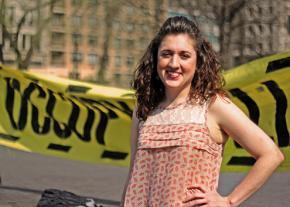Resolved to keep fighting
Occupy Wall Street activist Cecily McMillan was sentenced to three months in prison and five years of probation after her unjust conviction on charges of felony assault against a police officer who was attacking her. The sentence is far shorter than the seven years McMillan faced and the two years her lawyers told her to expect. But for her to spend any time at all behind bars is a travesty of justice.
McMillan was at a protest on the six-month anniversary of the founding of Occupy in Zuccotti Park when she was grabbed from behind by NYPD officer Grantley Bovell. McMillan says she reacted instinctively when a man dressed in plain clothes, who didn't identify himself as a cop, grabbed her breast--she elbowed him in the face. After her arrest, she suffered a seizure--and was left lying on the ground while a ring of cops stood around her.
For this, McMillan was charged with felony assault of a police officer. During her trial, Judge Ronald Zweibel repeatedly sided with the prosecution. The jury found her guilty in a unanimous verdict, but nine of the 12 jurors--shocked to learn that McMillan could spend up to seven years in prison--wrote a letter to Zweibel calling on him to be lenient and not sentence her to any jail time. Zweibel did order a lighter sentence than expected, but McMillan's supporters continue to call for her to be freed immediately.
Below we publish a statement from McMillan released the day before her sentencing and published at the Justice for Cecily website.
I CAME to New York the summer of 2011 to go to school. Rikers Island was definitely not on my list of intended experiences. Though I did call myself a radical, that title stretched only as far as to include plans to start a socialist student chapter and study welfare policy with aims of improving it. Within one week, these plans were railroaded by the Occupy Wall Street movement, and for the following three months, I did little else.
Like many, the eviction of Zucotti left me lost, searching for that infectious energy that bound so many together in efforts to transform the world. Like many, I've spent the years since trying to understand what we had and striving to get back to it. Like many, I pointed to a lack of militancy in our movement, a commitment of one's entire being, personally, politically, emotionally and physically to the greater good.
But as I examined what action those beautiful words entailed, I exchanged militancy for the concept of love ethic. A distinction born of the belief that fights between "us"es and "them"s run counter to the collective we--we being the human society with each person as an integral part that must be seen, heard, felt and loved in order to transform the whole. Like many, I found my beliefs easy to come by, but difficult to act on. I always strived, but often struggled, to see, hear, feel the love, even as I expected as much in return. I begin to question if it is such a struggle to solidify amongst a few, how can we hope to strengthen love ethic across many.

Unlike most, when my trial began, friends formed a support structure. Comrades came to court. Journalists reported injustices. When the verdict was read, cries of outrage were heard, the news was spread, and sympathy was shared from around the world. Unlike most, during my weakest hour, I had never felt more supported. Though I had never felt more oppressed, I had never felt so loved. I stand resolved to keep fighting because your love ethic props me up and allows me to do so. Unlike most, I am blessed with the support of so many, and though I am thankful, I am also thoughtful of the many forced to face such oppression alone.
I know you have already done so much, but I am going to ask for one thing more. If you feel safe enough to share, please raise your hand if you have ever suffered police violence. If you have suffered sexual violence. If you have suffered the violence of the justice system. If you have suffered the violence of the prison system. Oppression is rampant. Take a moment to try and really see, hear, feel the suffering of the many around you. Now imagine the power of your collective love ethic to stand against it. Only through the basic spread of such a love ethic by the many, for the many, not just a privileged few, we will finally have ourselves the movement we have been waiting for.
First published at Justice for Cecily.


